The Olympic opener will mark the ninth time the U.S. and Sweden have met in a major world championship, adding a distinct and unique flair to the matchup.
It has gotten to the point now where the draw is but a formality, and if the draw doesn't come through, then the knockout bracket gods evidently will take care of the rest.
If it's a major tournament (Women's World Cup or Olympics), chances are the U.S. women's national team and Sweden are playing each other. What started with the U.S.'s first match at a Women's World Cup ever has become a recurring theme in the national team's history—especially over the last decade—and will continue with Wednesday's Olympic group opener in Japan. This is the sixth major tournament on the women's soccer calendar dating back to 2011. It'll be the fifth in which the two sides meet, and the fourth in a row. With their ninth tournament meeting all-time, Sweden will become the most frequent side the U.S. has faced with the stakes at their highest, passing Brazil, Japan and Norway.
Even though the U.S. has a dominant edge in the all-time series on the major stage (6-1-1), Sweden has the last laugh on the Olympic podium. That draw in those eight matches was the quarterfinals of the 2016 Olympics, in which Sweden dealt the U.S. its earliest elimination ever, followed by the Hope Solo "cowards" fallout and aftermath. The U.S. rebounded to win the 2019 Women's World Cup—which included a win over Sweden, naturally—but there's still a sense of unfinished business as the focus shifts back to the Olympics. For a number of U.S. veterans, this could be the last run at glory. Prior to the expansion of Olympic rosters from 18 to 22 players, with the inclusion of alternates on the full squad, the average age for the USWNT was 30.8 years. Now, it's 29.7, but the point stands: While there are some young players on the rise and others firmly in their prime, this is not a young team.
With all that experience, though, comes a series of players who know what they're getting into vs. the Swedes. They make for a stout opponent, and while anything can happen in a group stage, you would expect the winner of Wednesday's match to wind up topping a quartet that also includes New Zealand and Australia.
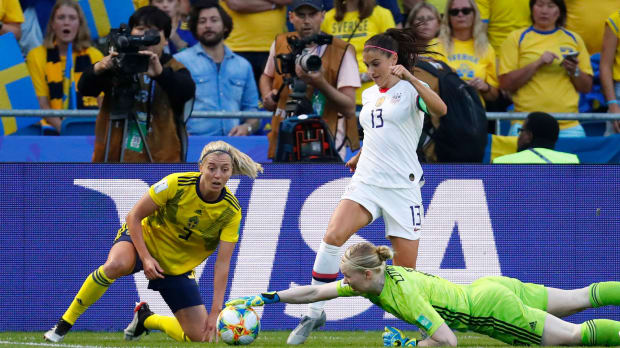
“Sweden has given us difficulty every single match we’ve played them, so we don’t take it lightly in the slightest,” Alex Morgan said before an April friendly vs. the Swedes in Stockholm, which came just over a week before the draw confirmed they'd be meeting again. “And we’re lucky to have been able to play Sweden so many times throughout the years. Even though we have come out on top most of the time, they've taken wins from us in big tournaments.”
The U.S. enters on a 44-match unbeaten streak, but it's a run that nearly ended at 37. Sweden outplayed the U.S. in that friendly, settling for a 1–1 draw after a shaky late penalty call gave Megan Rapinoe the chance to tie it.
"I think that this is, I wouldn't say one of the best things that happened to us, but something that is very good for us," Vlatko Andonovski, whose first match as USWNT coach was also against Sweden, said at the time. "In fact, that's why we came here. We came here to play good teams. We came [to] Europe to play opponents, to some extent get exposed to different tactics, high level tactics, organized teams and to try to overcome all that.
"If we play the way we played today [at the Olympics], it's not good enough, and I know that. Nobody has to tell me that. But again, it's just a good learning opportunity for us to get better."
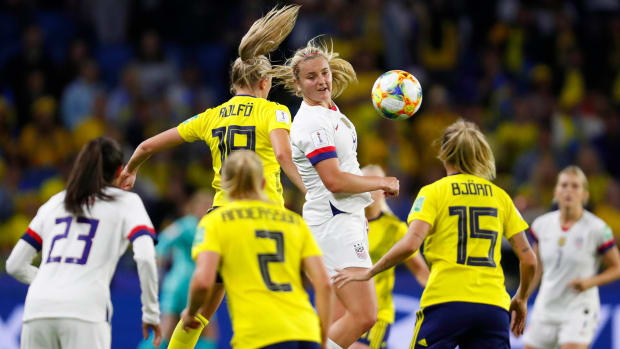
Did the U.S. learn from that? Wednesday will be telling. Revenge for five years ago isn't really on the table, with the loser not being eliminated and both sides widely expected to reach the knockout rounds. They've also played multiple times since their meeting in Brazil. But a positive result for the U.S. would go a long way toward closing the door on that last Olympic chapter and setting the foundation for a tournament run, while, on the contrary, a defeat could plant some seeds of doubt before the true high-stakes matches even take place.
"There's always going to be that bitterness behind us of the finish in 2016 and that being the worst finish that we've ever had in an Olympics. There's really no way to say otherwise," Morgan continued in those April remarks. "Of course when you think of it that way, we want to come back and be really dominant in the way that we play and this is like that first stepping stone to that. I can remember them obviously beating us then but also in 2011 in the World Cup, so they're a difficult team to play and to break down.
"A lot of the players, especially the players who were here during the 2016 Olympics, it’s in the back of our minds, and the players who weren’t here, we’ll make sure to remind them."
Before their next meeting—which will be the 42nd all-time (U.S. has a 23-6-12 edge)—here's a look back at the storied history between the two nations and what they'll be adding to in Tokyo:
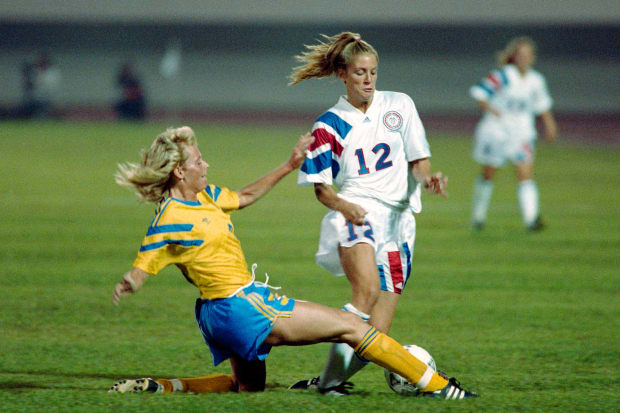
1991 Women's World Cup: The U.S., in its first match on a world championship stage, raced out to a 3–0 lead on goals from Carin Jennings (2) and Mia Hamm before holding on for a 3–2 win. Coincidentally, that's precisely how Andonovski's first match as U.S. manager went. In November 2019, Carli Lloyd's two goals sandwiched one from Christen Press to send the U.S. up 3–0 after 31 minutes, but Anna Anvegard scored twice in a four-minute span in the second half to make things interesting. Anvegard missed the April 2021 rematch but is on the Swedish Olympic squad.
Meanwhile, the U.S. went on to win the 12-team World Cup for the first of its four titles, while Sweden finished third.
1995 Women's World Cup: DNP
1996 Olympics: In the first women's soccer tournament at the Olympics, the USWNT and Sweden were both in the same group of the eight-team competition. In the second group match, Tisha Venturini and Shannon MacMillan gave the U.S. a 2–0 lead before a Carla Overbeck own goal accounted for the final tally in a 2–1 U.S. win. Sweden failed to reach the four-team knockout stage, while the U.S. finished second in its group and wound up winning the first of its four gold medals.
1999 Women's World Cup: DNP
2000 Olympics: DNP
2003 Women's World Cup: After the SARS outbreak forced FIFA to move the tournament from China to the U.S. four months before the opening match, the new hosts began group play with a 3–1 win in Washington, D.C. Kristine Lilly and Cindy Parlow (now U.S. Soccer president Cindy Parlow Cone) scored in the opening 36 minutes before Victoria Svensson cut into the lead in the 58th. Shannon Boxx sealed the three points for the U.S., but it was Sweden that would enjoy a more successful tournament, with the U.S. falling to Germany in the semifinals and Sweden losing to Germany on a golden goal in the final.
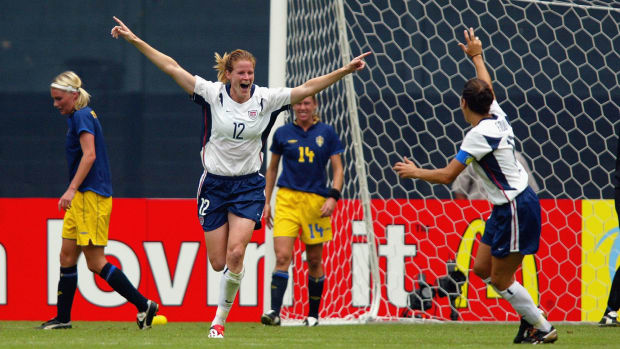
2004 Olympics: DNP
2007 Women's World Cup: Abby Wambach's double gave the U.S. a 2–0 win in the teams' second group game in China. Sweden failed to reach the knockout stage, while the U.S. settled for a third-place finish after getting hammered by Marta's Brazil 4–0 in the semifinals.
2008 Olympics: DNP
2011 Women's World Cup: Sweden's lone win in regulation came in the group finale in Germany, where Lisa Dahlkvist's penalty kick and an Amy LePeilbet own goal gave the Swedes a 2–0 edge after 35 minutes. Wambach pulled one back in the second half, but the 2–1 result had the U.S. settle for second in the group. An epic final vs. Japan resulted in a second-place finish for the U.S. overall, while Sweden claimed third by beating France.
2012 Olympics: DNP
2015 Women's World Cup: Facing former manager Pia Sundhage, the U.S. was held to a 0–0 draw in group play. Both wound up reaching the knockout stage, with Sweden bowing out in the round of 16 and the U.S. going on to win it all in Canada.
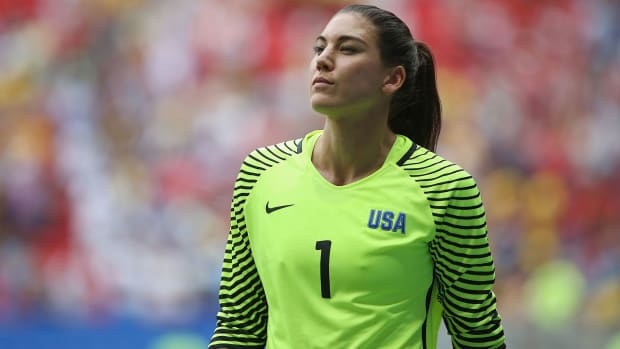
2016 Olympics: The match that looms over Wednesday's showdown. Morgan canceled out Stina Blackstenius's opener to give the U.S. new life in a match which it outshot the Swedes 27–6. It went to a penalty shootout, with Sweden sealing a 4–3 triumph after Press fired her shot over the crossbar and Dahlkvist clinched it. Solo went on her postgame rant about how Sweden played like "cowards" and never played for the U.S. ever again.
2019 Women's World Cup: The USWNT exacted a measure of revenge with a 2–0 win thanks to Lindsey Horan's third-minute goal and a Jonna Andersson own goal in the 50th minute. Sweden curiously rested a number of regulars, with manager Peter Gerhardsson making seven lineup changes and seemingly prioritizing fresh legs for the last 16 (and a potentially less daunting knockout path) over finishing first in the group. The U.S. ran the gauntlet in the tougher half of the bracket to win the title, while all that prevented a rematch in the final was Sweden losing to the Netherlands in extra time in the semifinals.
More Olympic Soccer Coverage:
- Geary: The Top Threats to the USWNT's Quest For Gold
- Creditor: The Most Intriguing Players in the Men's Tournament
- German Men's Olympic Team Walks Off Field Over Racial Abuse
The Olympic opener will mark the ninth time the U.S. and Sweden have met in a major world championship, adding a distinct and unique flair to the matchup.
It has gotten to the point now where the draw is but a formality, and if the draw doesn't come through, then the knockout bracket gods evidently will take care of the rest.
If it's a major tournament (Women's World Cup or Olympics), chances are the U.S. women's national team and Sweden are playing each other. What started with the U.S.'s first match at a Women's World Cup ever has become a recurring theme in the national team's history—especially over the last decade—and will continue with Wednesday's Olympic group opener in Japan. This is the sixth major tournament on the women's soccer calendar dating back to 2011. It'll be the fifth in which the two sides meet, and the fourth in a row. With their ninth tournament meeting all-time, Sweden will become the most frequent side the U.S. has faced with the stakes at their highest, passing Brazil, Japan and Norway.
Even though the U.S. has a dominant edge in the all-time series on the major stage (6-1-1), Sweden has the last laugh on the Olympic podium. That draw in those eight matches was the quarterfinals of the 2016 Olympics, in which Sweden dealt the U.S. its earliest elimination ever, followed by the Hope Solo "cowards" fallout and aftermath. The U.S. rebounded to win the 2019 Women's World Cup—which included a win over Sweden, naturally—but there's still a sense of unfinished business as the focus shifts back to the Olympics. For a number of U.S. veterans, this could be the last run at glory. Prior to the expansion of Olympic rosters from 18 to 22 players, with the inclusion of alternates on the full squad, the average age for the USWNT was 30.8 years. Now, it's 29.7, but the point stands: While there are some young players on the rise and others firmly in their prime, this is not a young team.
With all that experience, though, comes a series of players who know what they're getting into vs. the Swedes. They make for a stout opponent, and while anything can happen in a group stage, you would expect the winner of Wednesday's match to wind up topping a quartet that also includes New Zealand and Australia.

“Sweden has given us difficulty every single match we’ve played them, so we don’t take it lightly in the slightest,” Alex Morgan said before an April friendly vs. the Swedes in Stockholm, which came just over a week before the draw confirmed they'd be meeting again. “And we’re lucky to have been able to play Sweden so many times throughout the years. Even though we have come out on top most of the time, they've taken wins from us in big tournaments.”
The U.S. enters on a 44-match unbeaten streak, but it's a run that nearly ended at 37. Sweden outplayed the U.S. in that friendly, settling for a 1–1 draw after a shaky late penalty call gave Megan Rapinoe the chance to tie it.
"I think that this is, I wouldn't say one of the best things that happened to us, but something that is very good for us," Vlatko Andonovski, whose first match as USWNT coach was also against Sweden, said at the time. "In fact, that's why we came here. We came here to play good teams. We came [to] Europe to play opponents, to some extent get exposed to different tactics, high level tactics, organized teams and to try to overcome all that.
"If we play the way we played today [at the Olympics], it's not good enough, and I know that. Nobody has to tell me that. But again, it's just a good learning opportunity for us to get better."

Did the U.S. learn from that? Wednesday will be telling. Revenge for five years ago isn't really on the table, with the loser not being eliminated and both sides widely expected to reach the knockout rounds. They've also played multiple times since their meeting in Brazil. But a positive result for the U.S. would go a long way toward closing the door on that last Olympic chapter and setting the foundation for a tournament run, while, on the contrary, a defeat could plant some seeds of doubt before the true high-stakes matches even take place.
"There's always going to be that bitterness behind us of the finish in 2016 and that being the worst finish that we've ever had in an Olympics. There's really no way to say otherwise," Morgan continued in those April remarks. "Of course when you think of it that way, we want to come back and be really dominant in the way that we play and this is like that first stepping stone to that. I can remember them obviously beating us then but also in 2011 in the World Cup, so they're a difficult team to play and to break down.
"A lot of the players, especially the players who were here during the 2016 Olympics, it’s in the back of our minds, and the players who weren’t here, we’ll make sure to remind them."
Before their next meeting—which will be the 42nd all-time (U.S. has a 23-6-12 edge)—here's a look back at the storied history between the two nations and what they'll be adding to in Tokyo:

1991 Women's World Cup: The U.S., in its first match on a world championship stage, raced out to a 3–0 lead on goals from Carin Jennings (2) and Mia Hamm before holding on for a 3–2 win. Coincidentally, that's precisely how Andonovski's first match as U.S. manager went. In November 2019, Carli Lloyd's two goals sandwiched one from Christen Press to send the U.S. up 3–0 after 31 minutes, but Anna Anvegard scored twice in a four-minute span in the second half to make things interesting. Anvegard missed the April 2021 rematch but is on the Swedish Olympic squad.
Meanwhile, the U.S. went on to win the 12-team World Cup for the first of its four titles, while Sweden finished third.
1995 Women's World Cup: DNP
1996 Olympics: In the first women's soccer tournament at the Olympics, the USWNT and Sweden were both in the same group of the eight-team competition. In the second group match, Tisha Venturini and Shannon MacMillan gave the U.S. a 2–0 lead before a Carla Overbeck own goal accounted for the final tally in a 2–1 U.S. win. Sweden failed to reach the four-team knockout stage, while the U.S. finished second in its group and wound up winning the first of its four gold medals.
1999 Women's World Cup: DNP
2000 Olympics: DNP
2003 Women's World Cup: After the SARS outbreak forced FIFA to move the tournament from China to the U.S. four months before the opening match, the new hosts began group play with a 3–1 win in Washington, D.C. Kristine Lilly and Cindy Parlow (now U.S. Soccer president Cindy Parlow Cone) scored in the opening 36 minutes before Victoria Svensson cut into the lead in the 58th. Shannon Boxx sealed the three points for the U.S., but it was Sweden that would enjoy a more successful tournament, with the U.S. falling to Germany in the semifinals and Sweden losing to Germany on a golden goal in the final.

2004 Olympics: DNP
2007 Women's World Cup: Abby Wambach's double gave the U.S. a 2–0 win in the teams' second group game in China. Sweden failed to reach the knockout stage, while the U.S. settled for a third-place finish after getting hammered by Marta's Brazil 4–0 in the semifinals.
2008 Olympics: DNP
2011 Women's World Cup: Sweden's lone win in regulation came in the group finale in Germany, where Lisa Dahlkvist's penalty kick and an Amy LePeilbet own goal gave the Swedes a 2–0 edge after 35 minutes. Wambach pulled one back in the second half, but the 2–1 result had the U.S. settle for second in the group. An epic final vs. Japan resulted in a second-place finish for the U.S. overall, while Sweden claimed third by beating France.
2012 Olympics: DNP
2015 Women's World Cup: Facing former manager Pia Sundhage, the U.S. was held to a 0–0 draw in group play. Both wound up reaching the knockout stage, with Sweden bowing out in the round of 16 and the U.S. going on to win it all in Canada.

2016 Olympics: The match that looms over Wednesday's showdown. Morgan canceled out Stina Blackstenius's opener to give the U.S. new life in a match which it outshot the Swedes 27–6. It went to a penalty shootout, with Sweden sealing a 4–3 triumph after Press fired her shot over the crossbar and Dahlkvist clinched it. Solo went on her postgame rant about how Sweden played like "cowards" and never played for the U.S. ever again.
2019 Women's World Cup: The USWNT exacted a measure of revenge with a 2–0 win thanks to Lindsey Horan's third-minute goal and a Jonna Andersson own goal in the 50th minute. Sweden curiously rested a number of regulars, with manager Peter Gerhardsson making seven lineup changes and seemingly prioritizing fresh legs for the last 16 (and a potentially less daunting knockout path) over finishing first in the group. The U.S. ran the gauntlet in the tougher half of the bracket to win the title, while all that prevented a rematch in the final was Sweden losing to the Netherlands in extra time in the semifinals.
More Olympic Soccer Coverage:


0 Comments